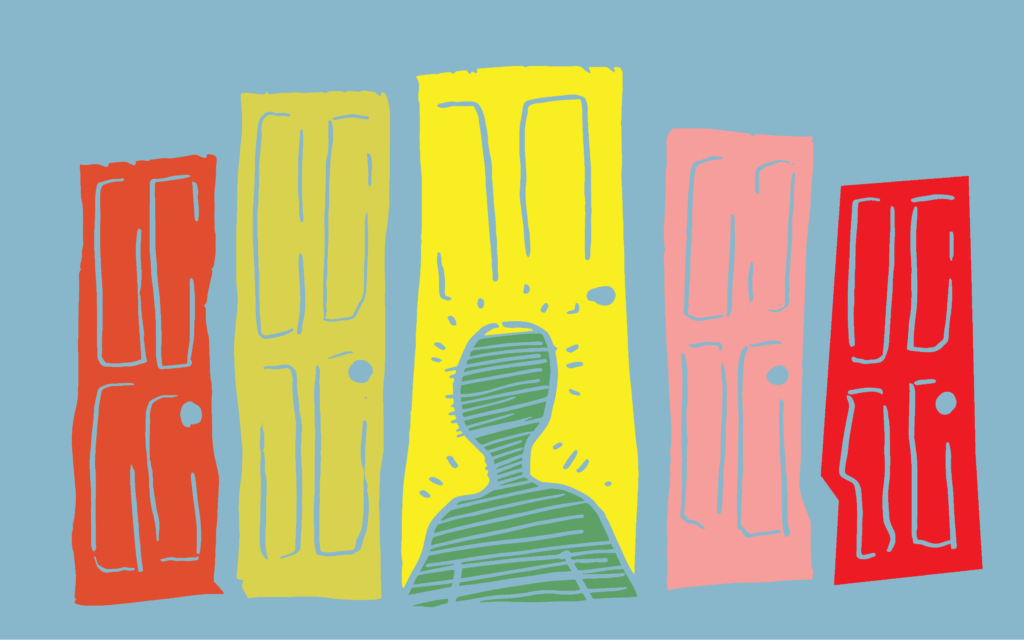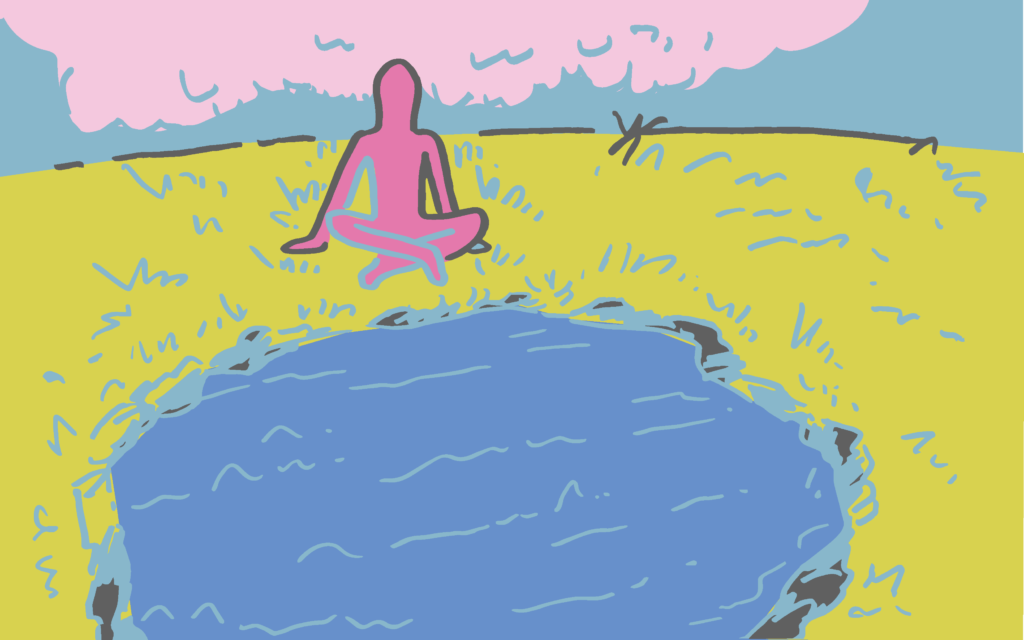When I was a child, everything moved toward summer. The gradually warming weather of spring promised lazier days. The celery-green of grass hinted of the deeper shades to come. Heavy coats were pushed to the back of the closet to hang there undisturbed for months. The leaden days that had weighed me down all winter long gave way to a pleasant lightness that made each new day a joy. And, of course, there was no school — three months of unfettered freedom from neckties, buzzers, homework, commands to be quiet, line up, sit down, fold your hands. No classrooms, no nuns, no clocks. Summer was one long afternoon when everything became softer and kinder. Time was forever.
Even sounds were clearer in the summer. Or maybe there were just more of them: the ice cream truck on its musical tour through the neighborhood . . . the roar of water exploding from city fire hydrants as we offered our bodies to the gushing torrent . . . the weekly clip-clop of the pony man, who came from the numerous stables that dotted what was marshland before it was cleared for hotels and sports stadiums. For 25 cents, we rode the pony up and down the length of the street, circled firmly in the saddle by the arms of the man riding behind us. Up the street was a pleasant trot, back a fast run with the pony’s mane flying in in our faces and on the street below the wild clattering of his hooves making our blood race in our veins.
Brightest among summer’s jewels was the annual family vacation at the Jersey shore. What shirts to bring? What shorts? Don’t forget the baseball gloves. There for two, three, four, and for one glorious summer, six weeks, I could go to the beach every day and lie in the sand soaking up the sun’s rays. At night, there was something about the sea air that made our dinners taste better than they ever did in the city.
But deeper than these tangible pleasures were the ones that spoke to the spirit: the sound of the sea that has played its single note for millions of years, louder in the evenings when there is less noise to drown it out, but an ever-present reminder of how far back the ribbon of time stretches; the cry of seagulls as you lie in bed in the early morning, as primitive as any heard by early man; the sight of bottle-nose dolphins threading silently through the sea, an act repeated how many trillions of times before it was ever witnessed by human eyes; standing on the beach at night and looking outward, the blackness of the sea and sky arching over you like all death until a flash of heat lightning momentarily ignites the heavens as if God had flicked on a gigantic neon lamp.
Nothing in our whole time at the shore topped the day we would rent a boat and go crabbing. Even though we were rarely more than 50 feet from the shoreline there was something about being on the water, the boat gently rocking, a seagull hanging motionless overhead that lent an almost mystical sense to it, like the white dove hovering over the Holy Family in medieval mosaics. Before we knew it, it was late afternoon and the baskets are alive with the sound of scuttling crabs we’ve caught. “Well, how about it,” says my uncle, the ex-sailor, who always captained the boat, “time to head back? We got a pretty good haul.” We hate to leave. The sun is laying late afternoon gold on the bay and the air is still deliciously warm on our faces. We are all tired but immensely happy as we turn back toward the dock with the day’s catch.
As it always did, the summer moved inexorably toward fall. The signs were unmistakable, and the first was always the same — the drive home. The high point of the summer was now past. The great days were gone. It was almost as if we were exiles, our purpose now being how to enjoy what time was left to us while trying to ignore the subtle but increasingly insistent reminders that change was coming: a new school bag, trees that began thinning out overhead while the sidewalks below cluttered up more each day with crisp, brown leaves that crackled beneath our feet, nights when I needed to pull the sheets over me as I slept.
Ever since Adam and Eve were ushered out of the Garden of Eden at the point of a flaming sword, Mankind has been looking for a way back to that forever-summer of perfect beauty, happiness and freedom from pain that was left behind. Some have looked for it in an actual location on the face of the earth. Others have searched for it in a state of mind. History and literature are replete with examples:
In Greece, 700 years before Christ, Paradise was the Golden Age of Kronos, described by Hesiod in his poem Works and Days: “A golden race of mortal men who lived . . . like gods without sorrow of heart,” a prescient glimpse of Adam’s creation in Genesis — God created man in His own image, in the image of God He created him.
In the 13th-century French romances of Camelot, Arthur’s knights are enjoined to “love one another and hold one another as dear as brothers . . . and there will be born in your hearts such a great joy and friendship that you will leave your wives and children to be with one another,” again, prophetic of Christ’s call to his disciples to “love me more than your father, mother, wife, children, brothers, and sisters — even more than your own life!”
Shakespeare’s Forest of Arden, in As You Like It, was an escape from the strictures of crass society into a magical world where reality and fantasy intertwine. By the play’s end, the characters have found the love they sought and the forest is once again a happy place ruled by the benevolent king of the fairies.
Modern authors have located the Earthly Paradise in any number of places, real and imaginary: Wordsworth in his Dove Cottage in Grasmere (“the loveliest spot that man hath ever found”); Yeats on the Lake Isle of Innisfree (“And I shall have some peace there, for peace comes dropping slow”); and James Hilton in Shangri La, his mountain utopia where the inhabitants live long lives free of the cares and sorrows of all those in the outer world.
All of these places, either in fact or fantasy, have one thing in common—each bears, in the minds of the authors, a mark of the divine. Without getting into the theological thicket of whether Adam and Eve were real people in a real garden or whether the whole story is pure allegory, I believe, with many others, that what we are really seeking is the nearness to God that was lost when Eden’s gates slammed shut, what St. Augustine put so poetically when he wrote: “Thou hast made us for thyself, O Lord, and our heart is restless until it finds its rest in thee.”
People have taken various paths in their efforts to regain that nearness. Some pursue the scientific life, finding in facts and data a fulfillment that actually strengthens their religious beliefs — Teilhard de Chardin, French philosopher and paleontologist, and Sir Isaac Newton, famous mathematician, for example. Others — British philosopher Bertrand Russell and Stephen Hawking, physicist and cosmologist, for instance — saw religious dogma as more hindrance than assistance to humanity. Some enter the religious life (St. Francis of Assisi, Mother Teresa, Gautama Bhudda), finding in humility and self-denial a path back to God. For others, all inhibitions must be stripped away, often through substance abuse, corruption, or other mis-directions, before innocence can be regained,

I believe that our search for the Earthly Paradise is both a sacred quest and a fool’s errand — sacred because its goal is God and foolish because the nearness to God that we’ve been searching for was never truly lost. What disappeared was our ability to recognize it.
For whatever reason — pride, disobedience, hubris, sin — what once we were able to see with perfect clarity — that something larger than ourselves awaits us with open arms—we now see, in the words of St. Paul, “through a glass darkly.” Our connection with God is as real as it ever was; it’s our perception of it that has become clouded. Could it be that all we really need is a trip to the optometrist? Metaphorically speaking, I think the answer is yes.
From Philadelphia’s earliest days, its southernmost tip along the east bank of the Schuylkill River had been swamp land. By the 19th century, squatters had settled there, turning it into an area of dirt roads, trash dumps, and a motley collection of shanty homes and pig farms. The area became known as “the Neck,” reflecting the gooseneck shape of the land, and the people who lived there, Neckers. As the 20th century dawned, city politicians began looking for ways to evict the Neckers and turn the land into a tax-producing asset. Although disputes with the Neckers persisted well into the 1950s, city politicians in 1912 were able to carve out 300 acres of the land for what became League Island Park (now Franklin Delano Roosevelt Park in honor of America’s war-time president).
But if you grew up in South Philly you didn’t go to League Island Park, you went to “The Lakes.” It was our treasured patch of green where you could fish or go boating on Meadow Lake (the largest body of water there), explore secluded glens where placid pools reflected the overhanging willow trees, walk along a Renaissance-styled boathouse or stand beneath the gazebo and gaze at what seemed to be a John Constable landscape come to life.
As a child, I went to The Lakes with my father and uncles to hit baseballs, skip stones along the surface of the water and climb trees. As a teenager, The Lakes held a different attraction. I remember many nights inching past parked cars with foggy windows in search of my own parking space where I could join other ardent adolescents as we groped our way through timeless rites of passage. Either the sheer number of cars was too great for the police to bother with or the times were kinder. They would cruise slowly past us but rarely make us leave. Now,
as an adult, I go there to experience that mystical bond of nature and humanity, that sense of past, present and future existing simultaneously. In the inner calmness that overtakes me, I am able to put things in proper context so that I can understand what they mean and where they belong in my life.

As I stand beneath the dome of the gazebo, all around me are waterfowl that either make The Lakes their home or use it as a convenient stopover in their journey to other places. White swans drift by like tiny gondolas. Iridescent mallard ducks reflect downward in the still water. White-feathered egrets and tall blue-gray herons stand statue-like among the reeds. And then it happens. At first, they’re only tiny specks in the sky coming over the horizon. As they come nearer, I make them out as hundreds of Canadian geese. They come soaring in like squadrons of miniature airplanes, each one in vee formation, wings outspread, legs lowered like landing gear. In wave after wave they touch down on the water, disturbing it only enough to leave a faint ripple that widens out behind them. The entire scene often takes place in total silence. Only when I catch my breath in a gasp and break the silence do I realize that I haven’t been breathing, caught up in a sight that is as old and meaningful as creation itself, overwhelmed by the peace and beauty of what I’m witnessing, awed by the poetry of things.
I am well aware that all of these memories and feelings are draped in a warm blanket of nostalgia for my childhood. And even if the Earthly Paradise did exist somewhere in space and time, I’m reasonably sure that it’s not now sitting in 21st century Philadelphia a baseball throw away from Citizens Bank Park where the Phillies play or a slap shot away from the Wells Fargo Center, the home of the Philadelphia Flyers. Yet, there is a half-holiness about being at The Lakes that recalls the summers at the shore or those times I’ve been the only person in a church in mid-afternoon when the lights are off and everything is still and shadowy and there is nothing but a surface of silence around me.
Countless centuries of war, madness, pride, and greed have badly bludgeoned the idea of ever finding perfect happiness again, indeed if humanity ever knew it at all. Yet the longing for it is still there. It remains in our collective consciousness like a jewel buried for eons waiting to be rediscovered by each person in his or her own way.
What I do know is that something inside me keeps pushing me toward something outside of me. The seashore and The Lakes are not a Grail that lift me out of reality. They are refuges from the boredom and madness and disappointments of daily life. They are places where solitude is not desolation, quiet not emptiness, places where I am both empty and full at the same time.
As long as the idea of Eden lives in us, Eden itself is not lost. When going back to a favorite childhood place, or being in a love relationship with someone, or serving our fellow human beings brings a sense of fulfillment or completion or boundless hope, then I think we are at least on the right path toward what we seek.
In his book An International Episode, Henry James wrote, “Summer afternoons: to me those two words have always been the two most beautiful words in the English language.” I suspect it wasn’t just the sound of them that so entranced James but the images and memories they conjured up. I know exactly what he was talking about. •




